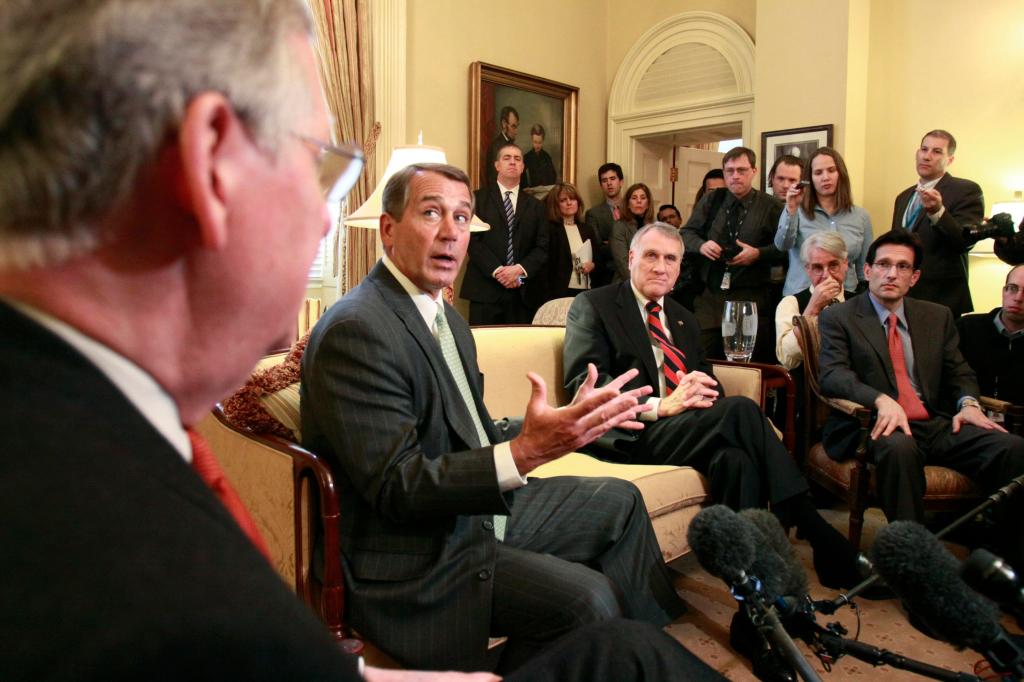President Obama’s nationally televised face-off today with Republican lawmakers over health care is as much about politics as policy, more debate than negotiation.
Few think that Obama will be able to win Republican support for his proposals, especially for the new plan he brings with him that is larger and more expensive than the ones they rejected in the past.
Rather, he heads into the session hoping to transform the debate over health care from a referendum on Democrats’ proposals — which he has been losing — into a choice between Democratic and Republican ideas over how to fix a system that both sides think needs fixing.
If he can win that debate in the eyes of the public, he could shore up support in Congress among nervous Democrats and perhaps push through some plan to extend coverage to more of the uninsured and try to rein in soaring costs. Moreover, he could change the dynamics of the coming elections for control of Congress and give his Democratic Party a better chance to ward off a tidal wave of anger that’s been building against them.
If he can’t dominate the debate, his prospects for passing comprehensive health care legislation — and Democrats’ prospects in the November elections — remain daunting.
Either way, both sides will sit down at a large square table in Blair House, across the street from the White House, keenly aware that the nation will be watching. (The talks from 10 a.m. to 4 p.m. EST will be televised on C-SPAN, with plentiful attention from cable news networks as well.)
”It will be a moment for the American people to compare and contrast the Barack Obama approach with the Republican approach,” said Ralph Neas, a liberal who leads the National Coalition on Health Care.
Despite the bully pulpit of the presidency and large majorities in both houses of Congress during a year of debate, Democrats say they have failed so far to explain why people should support their plans. They said they hoped the showdown will give them a chance at last to turn around public opinion.
”Our party has done a poor messaging job on health care from the outset,” said Rep. Rick Boucher, D-Va. ”The public’s confused. The reason for passing reform keeps shifting. First it was to help the uninsured. Then it was to reduce the budget deficit. Or make insurance more affordable.”
Republicans enter the talks deeply opposed to the proposal that Obama unveiled on Monday, saying he pulled further way from them by proposing to spend more than earlier versions passed by the Senate and House of Representatives.
”It’s hard to imagine what the purpose of Thursday’s summit is,” said Sen. Mitch McConnell, R-Ky., his party’s leader in the Senate.
”If the White House wants real bipartisanship, then it needs to drop the proposal it posted Monday, which is no different in its essentials than anything we’ve seen before — and start over.” Moreover, Republicans said the threatened possibility that Democrats might push the plan through the Senate with a simple majority rather than a 60-vote supermajority means the Democrats aren’t really trying to win over bipartisan support.
”Instead of starting over, Democrats in Congress continue to threaten to abuse the very rules of this institution by passing some version of their health care reform bill by a simple majority in the Senate, known as reconciliation,” Rep. Mike Pence, R-Ind., the chairman of the House Republican Conference, said Wednesday.
”You know, tomorrow’s summit is looking more and more like a taxpayer-funded media event designed to set up passage of ObamaCare 2.0, and the American people deserve to know it.”
Obama’s opening bid at the session will be his Monday proposal for a 10-year plan that would cost about $1 trillion, require insurance companies to cover pre-existing conditions, and nationally regulate insurance company rates.
Republicans will pitch a much more limited approach, including a House plan that would cost $61 billion over 10 years and put limits on malpractice awards against doctors and hospitals and open up interstate competition among insurers as a key to reining in medical costs.
”Those are the kinds of things that target the cost issue, which the American people thought this was all about from the beginning,” McConnell said. ”You will not see from us a 2,700-page comprehensive rewrite of one-sixth of our economy.”
Send questions/comments to the editors.



Success. Please wait for the page to reload. If the page does not reload within 5 seconds, please refresh the page.
Enter your email and password to access comments.
Hi, to comment on stories you must . This profile is in addition to your subscription and website login.
Already have a commenting profile? .
Invalid username/password.
Please check your email to confirm and complete your registration.
Only subscribers are eligible to post comments. Please subscribe or login first for digital access. Here’s why.
Use the form below to reset your password. When you've submitted your account email, we will send an email with a reset code.